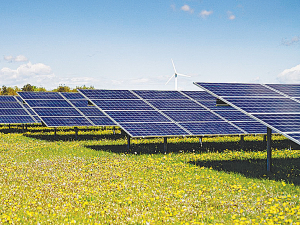Arla Foods delivers $15b revenue as Co-op turns 25
European dairy giant Arla Foods celebrated its 25th anniversary as a cross-border, farmer-owned co-operative with a solid half-year result.
 Arla Foods will be using solar energy to meet one-third of its electricity consumption within two years.
Arla Foods will be using solar energy to meet one-third of its electricity consumption within two years.
European dairy giant Arla Foods will be using solar energy to meet one-third of its electricity consumption within two years.
The co-operative has inked a deal with renewable energy company Better Energy for the establishment of four new solar parks in Denmark.
Under the 10-year agreement, the dairy cooperative commits to purchase the majority of the electricity from the new solar parks.
This constitutes the largest supply agreement in Danish history on renewable energy without public funding.
The parks have an expected capacity of 250 GWh, corresponding to the annual energu consumption of 156,000 average Danish citizens, and enough to cover about one third of Arla Foods' electricity consumption in Denmark.
Arla is increasing its target for reducing emissions in operations and logistics from 30 to 63 per cent: the solar park deal is one of several initiatives to help Arla meet its new 2030 emissions reduction target for its internal value chains.
Hanne Søndergaard, executive vice president at Arla Foods, says it is proud to be one of the first farmer-owned dairy cooperatives in the world to have a 1.5°C target.
"The new solar parks will play an important role in our shift towards renewable electricity and low-energy solutions at Arla Foods," says Søndergaard.
"Our Danish sites from a major part of our operations, which is why we are very pleased to begin our transition towards green electricity in Denmark."
By the end of 2025, Arla Foods' electricity consumption in EU will come from renewable energy sources, with the majority through green power purchase agreements and investments in solar and wind projects. With this new collaboration, Arla says it is taking a major step towards self-sufficiency in green electricity.
"Arla and our farmer owners continuously invest in new initiatives all the way from cow to grocery store with the aim of reducing our emissions and energy consumption. These initiatives include climate checks on the farms, reduction of food waste, sustainable packaging and green energy sources," says Søndergaard.
As a significant part of Arla Foods' dairy sites and logistics emissions is directly linked to electricity consumption from dairy sites and logistics, the dairy cooperative continues to implement solutions in this area, adds Søndergaard.
"Our nearly 300 organic farmers and our biggest dairy sites in Denmark already run entirely on green electricity.
"The agreement with Better Energy is an important step in the right direction, and a way for Arla to contribute to the overal increase in Denmark's green energy production."
The first solar park is expected to start delivering electricity by early 2023, and all four parks are scheduled to supply electricity by early 2024. Better Energy is responsible for the construction, operation, and maintenance of the solar parks, which take up a total of 280 hectares of land.
Going Green
By the end of 2025, Arla Foods' electricity consumption in EU will come from renewable energy sources, with the majority through green power purchase agreements and investments in solar and wind projects.
The argeement is a major step for Arla towards achieving its target of having electricity consumption in Europe that is entirely reliant on renewable energy sources by the end of 2025.
Arla Foods' nearly 300 organic farmers and biggest dairy sites in Denmark already run entirely on green electricity.
The Meat Industry Association of New Zealand (MIA) today announced that Chief Executive Officer Sirma Karapeeva has resigned from the role.
The winners of the 2026 Hawke’s Bay/Wairarapa Dairy Industry Awards were announced at the annual awards dinner held at Copthorne Solway Park in Masterton on Thursday evening.
Environment Southland is welcoming this week’s decision by the Environmental Protection Authority (EPA) to approve the release of Blaptea elguetai, a leaf‑feeding beetle that will help control the highly invasive Chilean flame creeper.
This March, the potato industry is proudly celebrating International Women’s Day on 8 March alongside the International Year of the Woman Farmer, recognising the vital role women play across every part of the sector — from paddocks and packhouses to research, leadership, and innovation.
Fruit trader Seeka posted a record profit and returns to shareholders in 2025.
Recent weather events in the Bay of Plenty, Gisborne/Tairawhiti, and Canterbury have been declared a medium-scale adverse event.
OPINION: Staying with politics, with less than nine months to go before the general elections, there’s confusion in the Labour…
OPINION: Winston Peters' tirade against the free trade deal stitched with India may not be all political posturing by the…